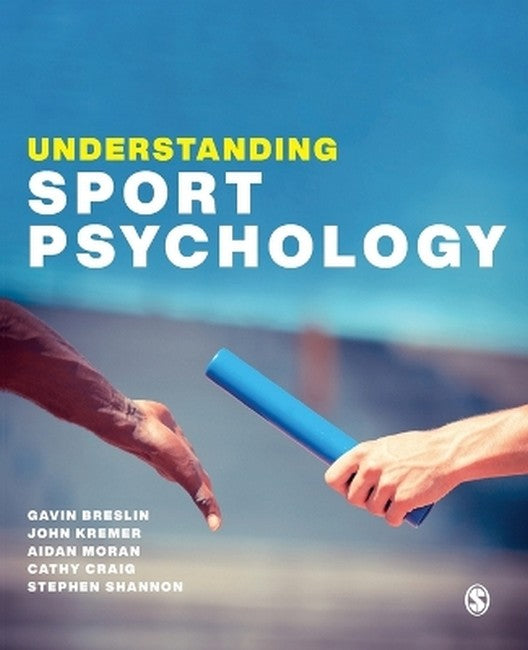Gavin Breslin is a Senior Lecturer in the Bamford Centre for Mental Health and Wellbeing, School of Psychology, Ulster University, Coleraine. He has applied sport psychology to national and international athletes across a range of sports. He is the Chief Assessor for the British Psychological Society's Qualification in Sport and Exercise Psychology. His book publications include Sport and Exercise Psychology Practitioner Case Studies (2016), and Mental Health and Wellbeing Interventions in Sport: Research, Theory and Practice (2019). John Kremer is a former Reader in Psychology at Queen's University Belfast, where he lectured from 1980. He combines his academic interest in sport and exercise psychology with practical work with numerous sports, including several national and international teams and individual athletes. His list of book publications include Pure Sport: Sport Psychology in Action (2019), Sport Psychology: Contemporary Themes (2012), Psychology in Sport (1994) and Young People's Involvement in Sport (1997). Aidan Moran was Professor of Cognitive Psychology and Director of the Psychology Research Laboratory in University College, Dublin. A Fulbright Scholar and former Editor-in-Chief of the International Review of Sport and Exercise Psychology, he has published extensively on mental imagery and attentional processes in athletes. A former psychologist to the Irish Olympic squad, Aidan advised many of Ireland's leading athletes and teams and is rightly credited as the founding father of sport psychology in Ireland. Cathy Craig is a Professor in Perception and Action Psychology at the School of Psychology, Ulster University and CEO/Co-Founder of INCISIV, a neuro-technology company based in Belfast, Northern Ireland. She publishes extensively on motor timing, perception/action and decision making in sport. Much of her work involves working closely with elite sporting organisations to develop innovative solutions, using technologies such as immersive, interactive virtual reality, to better understand how perception influences decisions about action. Stephen Shannon is a Lecturer in the School of Sport at Ulster University within the Faculty of Life and Health Sciences, and holds a BSc (hons), PgDip, and PhD from Ulster University, along with a Fellowship of the Higher Education Academy. In a research capacity, he conducts his research through the Sport and Exercise Research Institute and the Bamford Centre for Mental Health and Wellbeing, and has published several peer-reviewed articles on mental health promotion within and through sport and physical activity. Additionally, Stephen has provided written evidence to the House of Lords Select Committee on Sport and Recreation, and has delivered and hosted conference symposiums in Ireland, the UK and Internationally. In a teaching and learning discipline, Stephen teaches on several undergraduate and postgraduate psychology, research methods and social science modules at Ulster. He is also Course Director for the BSc Sport, Physical Activity and Health, in addition to fulfilling an active supervisory role with MSc and PhD student research projects.
Request Academic Copy
Please copy the ISBN for submitting review copy form
Description
1: INTRODUCING SPORT PSYCHOLOGY 1.1 The History of Sport Psychology 1.2 Practising Sport Psychology 1.3 Ethical Issues in Sport Psychology 1.4 Sport Psychology Organisations, Sources and Resources 2: ANXIETY AND STRESS IN SPORT 2.5 Stress, Anxiety and Arousal 2.6 Measuring Stress and Anxiety 2.7 Pre-performance Routines 2.8 Choking Under Pressure 2.9 Coping Strategies 3: MOTIVATION 3.10 Sport Participation: Motives and Correlates 3.11 Burnout and Drop-out 3.12 Goal Setting 3.13 Fear of Failure and Need to Achieve 3.14 Self-Determination Theory 3.15 Achievement Goal Theory 3.16 Self-Efficacy and Perceived Competence 4: COGNITIVE PROCESSES IN SPORT 4.17 Mental Imagery 4.18 Mental Practice 4.19 Attention and Concentration 4.20 Positive Self-Talk and Thought Control 4.21 Mental Toughness 5: SOCIAL PSYCHOLOGY OF SPORT 5.22 Team Cohesion 5.23 Team Building 5.24 Causal Attribution 5.25 Social Facilitation and Social Loafing 5.26 Leadership and Management 5.27 Effective Coaching Styles 5.28 Home Advantage 5.29 Aggression 5.30 Fans and Spectators 5.31 Social Identity Theory 6: MOTOR SKILLS 6.32 Motor Development 6.33 Expertise 6.34 Decision-Making 6.35 Practising Motor Skills 6.36 Analysis and Measurement of Motor Performance 7: SPORT, MENTAL HEALTH AND WELLBEING 7.37 Gender, Diversity and Inclusion 7.38 Overtraining and Exercise Addiction 7.39 Injury and Retirement 7.40 Mental Health Awareness in Sport 7.41 Mental Health Disorder in Sport 7.42 Resilience 7.43 Mindfulness and Wellbeing in Sport

